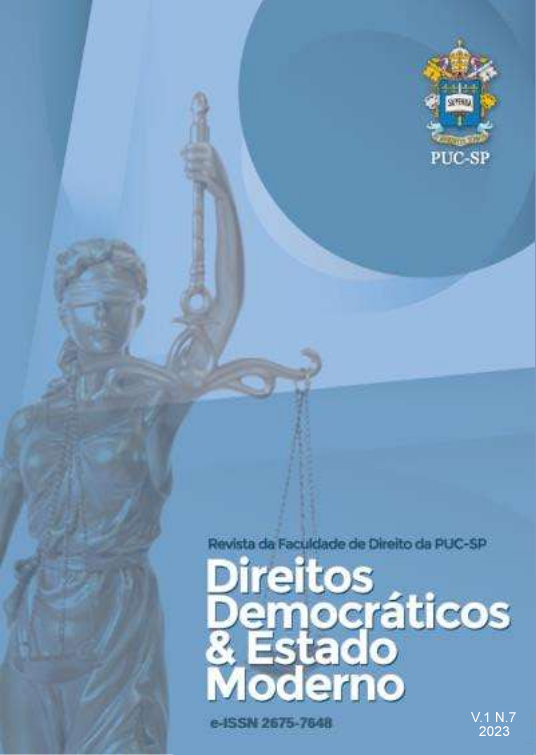A fraternidade como princípio consectário à Dignidade da Pessoa Humana à luz da interpretação e aplicação da Constituição
DOI:
https://doi.org/10.23925/ddem.v.1.n.7.60901Palavras-chave:
Princípios, Dignidade da pessoa humana, Fraternidade, Interpretação constitucionalResumo
Objetivo: impõe um novo pensar sobre todas as questões protetivas que envolvem o indivíduo, como o princípio da dignidade da pessoa humana, a cidadania, a ética e a necessidade preeminente de construção axiológica de um princípio da fraternidade. A Constituição (BRASIL, 1988) pode contribuir de forma muito engrandecedora para a construção de novos paradigmas interpretativos na construção do princípio da fraternidade, cujo escopo é contribuir para uma sociedade mais solidária no plano interno e numa construção de valores colaborativos internacionais fundados igualmente na fraternidade e na solidariedade, mas também no respeito e na compaixão em relação ao próximo.
Metodologia: utiliza-se uma metodologia científica dedutiva, por meio de estudos bibliográficos, principalmente pela observação de forma crítica fenomenológica da realidade social, principalmente no conflito existente atualmente na Ucrânia, cuja crueldade é um tema de destaque, paulatino e diuturno nos noticiários.
Justificativa: diante da retomada, no cenário mundial, de discursos de ódio, neonazistas e neofacistas, de caráter extremamente intolerante e discriminatório, impõe-se ao cientista social a necessidade de construção e (re) construção de conceitos em que o indivíduo, todos os indivíduos, sem distinção, inserem-se em um núcleo intangível de proteção e, para tanto, socorre-se a partir do pragmatismo hodierno, da construção de axiomas relacionados aos princípios e conceitos propostos neste estudo.
Resultados: (i) a necessidade de uma reconstrução de axiomas em relação às normas já existentes; (ii) para tanto os estudos apontam o caminho da interpretação constitucional diante da carga valorativa existente na Carta Política brasileira atual; e (iii) a leitura da fraternidade como um princípio constitucional, consectário da dignidade da pessoa humana, sem prejuízo da incidência de valores como a ética como pauta de conduta de exercício da cidadania.
Contribuições: a contribuição científica auferida a partir da pesquisa proposta é a necessidade contínua e resiliente de estudar os conceitos nucleares e periféricos relativos à fraternidade e à dignidade da pessoa humana para a construção de uma sociedade com igualdade de oportunidades, solidária e próspera para as gerações presentes e futuras.
Referências
BACEGA DE BASTIANI, Ana Cristina; PELLENZ, Mayara; FERNANDES DE AQUINO, Sérgio Ricardo. Metamorfoses do Direito: Exigências Constitucionais a partir da Fraternidade e da Solidariedade. Novos Estudos Jurídicos, v. 20, n. 3, p. 959, 9 dez. 2015.
BARROSO, Luís Roberto. Constituição da República Federativa do Brasil Anotada. São Paulo: Saraiva, 1998.
BRASIL. Constituição da República Federativa do Brasil. Disponível em: http://www.planalto.gov.br/ccivil_03/constituicao/constituicao.htm. Acesso em: 8 fev. 2023.
BRASIL. Acórdão: STF, ADIn n. 2.076-5/AC, 8 ago. 2003. Disponível em: www.stf.jus.br. Acesso em: 7 fev. 2023
BRASIL. Relatório Walk Free. Disponível em: https://agenciabrasil.ebc.com.br/direitos-humanos/noticia/2016-05/. Acesso em: 7 fev. 2023.
BRITTO, Carlos Ayres. Teoria da Constituição. Rio de Janeiro: Forense, 2003.
CANOTILHO, José Joaquim Gomes. Direito Constitucional e Teoria da Constituição. 7. ed. Coimbra: Almedina, 1997.
COMTE, Auguste. Catecismo Pozitivista. Lisboa: Imprensa Lucas & Cia, 1934.
COMTE, Auguste. Opúsculos de Filosofia Social. São Paulo: Editora da USP, 1972.
FONSECA, Reynaldo Soares da. Fraternidade e Jurisprudência: uma análise hermenêutica. Mauá: Letras Jurídicas – Coleção Univem. 2019.
GONÇALVES, Rodrigo Portão Puzine; CENCI, Daniel Rubens; STEFFLER, Hellin Thaís. Canibalismo social. Direitos Democráticos & Estado Moderno, v. 2, n. 5, p. 123–139, 21 set. 2022.
HABERMAS, Jürgen. Pensamento pós-metafísico: estudos filosóficos. Rio de Janeiro: Tempo Brasileiro, 1990.
HABERMAS, Jürgen. A constelação pós-nacional: ensaios políticos. São Paulo: Littera-Mundi, 2001.
MARCHIONNI, Antônio; SANTOS FILHO, Ivanaldo Oliveira dos; DI LORENZO, Wambert Gomes. Humanidades em Maritain - Ensaios Sobre o Pensamento Humanista Contemporâneo. São Paulo: Editora Clássica, 2017.
MARITAIN, JACQUES. Humanismo Integral - Problemas Temporais e Espirituais de Uma Nova Cristandade. São Paulo: Editora Cultor de Livros, 2018.
MARITAIN, JACQUES. Le crépuscule de la civilisation. In: Oeuvres completes. Fribourg: Editions Universitaires, 1988. p. 729–735.
MONTORO, Franco. Da “Democracia” que temos para a Democracia que Queremos. Rio de Janeiro: Paz e Terra, 1974.
MORAES, Alexandre de. Constituição do Brasil interpretada e legislação constitucional. 7. ed. São Paulo: Atlas, 2007.
ONU. Declaração Universal dos Direitos Humanos. Disponível em: https://www.unicef.org/brazil/declaracao-universal-dos-direitos-humanos. Acesso em: 2 fev. 2023.
PIOVESAN, Flávia Cristina. Direitos humanos e justiça internacional: um estudo comparativo dos sistemas regionais europeu, interamericano e africano. São Paulo: Saraiva, 2018.
POZZOLI, Lafayette; PIERRE, Luiz Antonio de Araújo et al. Fraternidade como categoria jurídica. Vargem Grande Paulista: Cidade Nova, 2013
SANTIAGO, Bráulio Junqueira. A filosofia do Humanismo Integral no Direito: A contribuição do pensamento de Auguste Comte e Jacques Maritain para o fundamento Jusfilosófico dos Direitos Humanos. [s.l.] Pontifícia Universidade Católica de São Paulo, São Paulo, Brasil, 2013.
SARLET, Ingo Wolfgang. A eficácia dos direitos fundamentais. Porto Alegre: Livraria do Advogado, 2009.
SILVA, José Afonso da. Comentário contextual à Constituição. 2. ed. São Paulo: Malheiros, 2006.
SILVA, Luciano Braz da. Por que repensar o humano? a biopolítica, o biopoder e o direito. Direitos Democráticos & Estado Moderno, n. 3, p. 248–249, 20 dez. 2021.
Downloads
Publicado
Como Citar
Edição
Seção
Licença
Copyright (c) 2023 Direitos Democráticos & Estado Moderno

Este trabalho está licenciado sob uma licença Creative Commons Attribution 4.0 International License.

Este obra está licenciada com uma Licença Creative Commons Atribuição 4.0 Internacional.
Revista DD&EM - ISSN 2675-7648
















